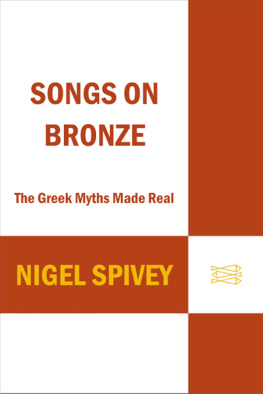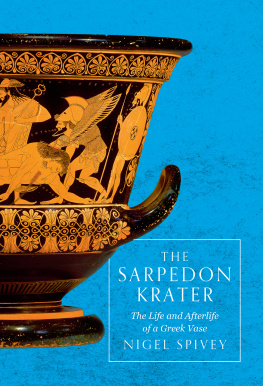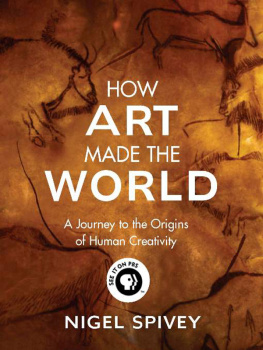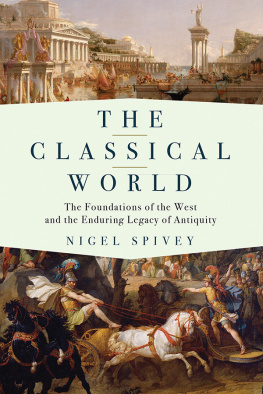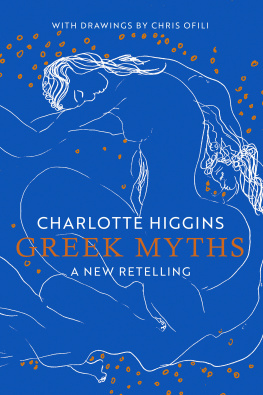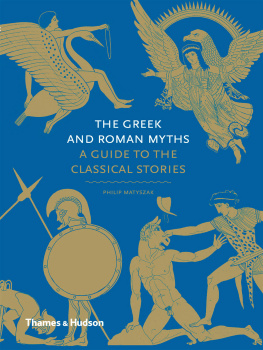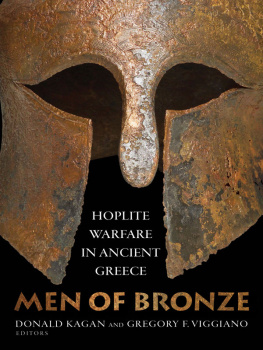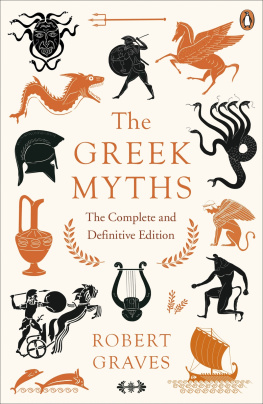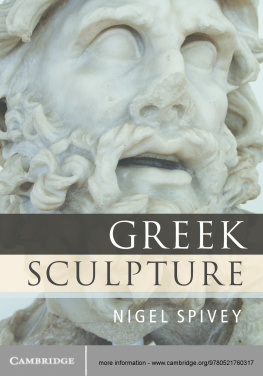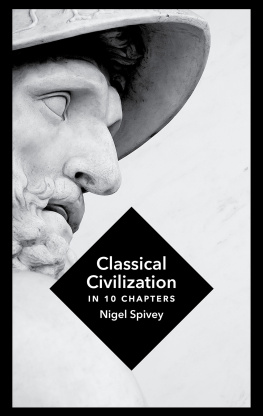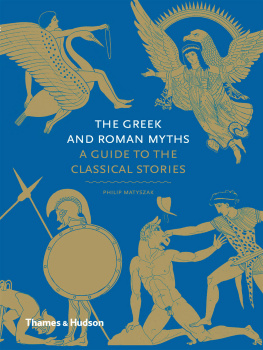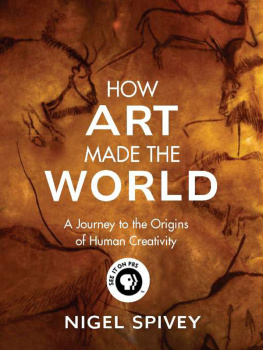Spivey - Songs on Bronze: The Greek Myths Made Real
Here you can read online Spivey - Songs on Bronze: The Greek Myths Made Real full text of the book (entire story) in english for free. Download pdf and epub, get meaning, cover and reviews about this ebook. City: New York, year: 2005;2006, publisher: Farrar Straus Giroux, genre: Detective and thriller. Description of the work, (preface) as well as reviews are available. Best literature library LitArk.com created for fans of good reading and offers a wide selection of genres:
Romance novel
Science fiction
Adventure
Detective
Science
History
Home and family
Prose
Art
Politics
Computer
Non-fiction
Religion
Business
Children
Humor
Choose a favorite category and find really read worthwhile books. Enjoy immersion in the world of imagination, feel the emotions of the characters or learn something new for yourself, make an fascinating discovery.
- Book:Songs on Bronze: The Greek Myths Made Real
- Author:
- Publisher:Farrar Straus Giroux
- Genre:
- Year:2005;2006
- City:New York
- Rating:4 / 5
- Favourites:Add to favourites
- Your mark:
- 80
- 1
- 2
- 3
- 4
- 5
Songs on Bronze: The Greek Myths Made Real: summary, description and annotation
We offer to read an annotation, description, summary or preface (depends on what the author of the book "Songs on Bronze: The Greek Myths Made Real" wrote himself). If you haven't found the necessary information about the book — write in the comments, we will try to find it.
Songs on Bronze: The Greek Myths Made Real — read online for free the complete book (whole text) full work
Below is the text of the book, divided by pages. System saving the place of the last page read, allows you to conveniently read the book "Songs on Bronze: The Greek Myths Made Real" online for free, without having to search again every time where you left off. Put a bookmark, and you can go to the page where you finished reading at any time.
Font size:
Interval:
Bookmark:

Understanding Greek Sculpture
Enduring Creation
The Ancient Olympics
How Art Made the World
SONGS ON
BRONZE
THE GREEK MYTHS MADE REAL

NIGEL SPIVEY

FARRAR STRAUS GIROUX
NEW YORK
Farrar, Straus and Giroux
19 Union Square West, New York 10003
Copyright 2005 by Nigel Spivey
All rights reserved
Printed in the United States of America
First edition, 2005
Library of Congress Cataloging-in-Publication Data Spivey, Nigel Jonathan.
Songs on bronze: the Greek myths made real / Nigel Spivey. 1st ed.
p. cm.
ISBN-13: 978-0-374-26663-9
ISBN-10: 0-374-26663-8 (alk. paper)
1. Mythology, Greek-Fiction. I. Title.
PR6119.P585S67 2005
823.92dc22
2004024353
Designed by Jonathan D. Lippincott
www.fsgbooks.com
1 3 5 7 9 10 8 6 4 2
On Saturday, July 30, Dr. Johnson and I took a sculler at the Temple-stairs, and set out for Greenwich. I asked him if he really thought a knowledge of the Greek and Latin languages an essential requisite to a good education. JOHNSON. Most certainly, Sir; for those who know them have a very great advantage over those who do not. Nay, Sir, it is wonderful what a difference learning makes upon people even in the common intercourse of life, which does not appear to be much connected with it. And yet, (said I) people go through the world very well, and carry on the business of life to good advantage, without learning. JOHNSON. Why, Sir, that may be true in cases where learning cannot possibly be of any use; for instance, this boy rows us as well without learning, as if he could sing the song of Orpheus to the Argonauts, who were the first sailors. He then called to the boy, What would you give, my lad, to know about the Argonauts? Sir (said the boy), I would give what I have. Johnson was much pleased with his answer, and we gave him a double fare.
Boswell, Life of Johnson, entry for 1763


Songs on Bronze originated from the desire to fashion a single, organic narrative of as much Greek mythology as most people might want or need to know.
This means a less than comprehensive work. Not every tale of the ancient Greek repertoire has been included here. Some storiessuch as the saga of the Seven Against Thebesare much abbreviated. I wanted this book to be a fluent read, not an unrelenting inventory of names, places, and atrocious events. To select is an authors privilege: for there is, after all, no bible of Greek mythology, nor any canonical version of exactly what happened and where. In antiquity, scholars disputed whether Argos or Mycenae had been Agamemnons home; likewise, whether it was Theseus or Herakles who killed the Minotaur depended on where in the Mediterranean one heard the story told. As for pursuing any historical reality behind the war at Troy, or plotting the precise route taken by the Argonauts, I have gone no further than to weave in some incidental details derived from Bronze Age archaeology.
If myths were bound by time and place, then they would not be myths. Nevertheless, I have tried above all to visualize how legends were formed, to convey the marvelous immediacy of these ancient story lines. The examples of classical authors naturally helped, especially those in Homers moldalways more concerned to relate how something happened that just to tell what happened. Often, too, I drew upon images from the pastpainted vases, archaic temple reliefs, and suchlike. And ultimately there was also a certain amount of sheer Method acting. If anyone did see me on a stretch of Corfus shore, lunging with a stick-spear, muttering to myself, let them know now that this was only the author at work, rehearsing the fury of Ajax.
At the outset I intended to write this book for my young childrenwith due regard for their delicate sensibilities. They, however, grew up more quickly than I wrote. So I accepted the violence and sensuality of the myths, and made little effort to cut or purify them. At the same time, of course, I am no more than sympathetic to the pagan world. If my depiction of the Olympian gods lacks true piety, I claim the honorable company of Homer, Ovid, and others.
A single image explains the tide. Hephaistos, the master craftsman, is crouched over his anvil. Before him is a large, circular shield, embossed with scenes that strike the eye. He has fashioned many figures upon this shield: mountains, cities, forests, strange animals, and more, but most striking of all, the figures of people caught in all the varied postures of their lives. Embraced, or in the throes of war; joining the dance, or hard at work: whatever their actions, these figures proudly occupy the shields concentric rings. Their stories stand out. Tapped and battered, so tested and true; stories tempered to resist.
The master craftsman holds his work up to the light. He breathes upon the shield. The figures mist, then shine again.
The bronze begins to sing.
Nigel Spivey
Cambridge, England, 2004

Eurydice was a girl born to the company of dryads, the spirits of woodlands and fields. So there was nothing she liked better than to hitch up her skirts and run barefoot through open countryside. And Orpheus, who loved her, was inclined to let her go. He was a poet: therefore it delighted him to see her move so free and fast. He doubted he could ever match her easy, flashing strides.
Just once he tried: kicked off his sandals, and followed in her trail. Within moments, he was howling in agony, hopping and clutching his heel. Eurydice dashed back to where he lay collapsed on the ground. She saw straightaway it was not the end of the world. Bending over, she seemed to plant a lingering kiss on the sole of her beloveds foot. With the tip of her tongue she located a thorn. Gently she extracted it, teasing it out with her teeth.
Orpheus swooned with relief. Eurydice held up the source of his pain: a tiny needle from the wild. Orpheus gasped in disbelief. Was that what brought me down?
She nodded.
Ah, he sighed. A lesson to us all.
How so? she wondered.
How Eros does his work, Orpheus went on. We hardly see him, the little lord of Love. Yet sure enough we feel his darts. Each one a spear thrust through the ribs.
He lay back in the grass and closed his eyes. She knelt beside him, stroking his brow.
Was that how it was with me? she asked.
With you oh, yes. With you, young Eros stabbed me very hard. A mortal woundno less.
Her fingers trembled in his hair. This man was a wondrous weaver of words, a ceaseless stitcher of songs: yet every utterance of his was like the stuff of truth. She deeply trusted him.
He sensed the hurt he had caused, and reached out for her hand.
I only meant, he said, that youthat you complete my life.
Orpheus had a certain far-off sense: that one day he would die for the love of his Eurydice. But he did not put it like that. Now she lay down with him, making what they craved: a meadowy hide, a refuge within sweet grass stalks where they were joined and enclosed.
Font size:
Interval:
Bookmark:
Similar books «Songs on Bronze: The Greek Myths Made Real»
Look at similar books to Songs on Bronze: The Greek Myths Made Real. We have selected literature similar in name and meaning in the hope of providing readers with more options to find new, interesting, not yet read works.
Discussion, reviews of the book Songs on Bronze: The Greek Myths Made Real and just readers' own opinions. Leave your comments, write what you think about the work, its meaning or the main characters. Specify what exactly you liked and what you didn't like, and why you think so.

